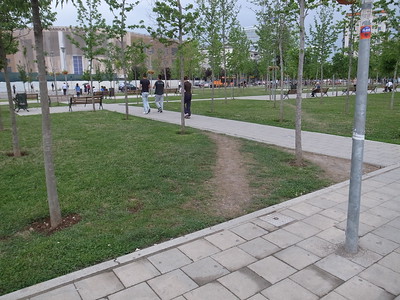
Why do people just leave their partners in relationship rather than working and solving the differences? Why do people make excuses rather than taking accountability of their own works? Why do people assume things rather than communicating and comprehending? Turns out, the answer to all these human behaviors can be explained by one profound law – “The Principle of Least Effort“, among other possible factors.
What is Principle of Least Effort?
In 2004, Zao Liu and Zheng Ye (Lan) Yang conducted a study to understand the Texas A&M distance learning graduate students’ preference for seeking library resources, and the reason behind those preferences. The conclusion found that – no brainer – the Internet was the most used, while libraries were the next most used resource for conducting class research. The study found that the Principle of Least Effort was the primary behavior model of the most distance learning students, because of their strong preference towards easy and fast information retrieval.
This is what Principle of Least Effort is all about. In pursuit of reaching from point A to point B, humans will mostly choose the path where the least effort is required.

In this image, the desired path – the trail created on the grass – reflects best about this behavior of humans. Even though there doesn’t seem to be significant time saving while going by or around the pole stuck in the middle of the walking path, humans will evidently choose to go diagonal and walk forward and take a 90-degree turn (well, thanks to Pythagoras too!).
Human Behavior & Principle of Least Effort
So how does this Principle of Least Effort reflect in human behaviors?
Known as a “deterministic description of human behavior”, this principle applies largely on day to day human behaviors. As long as the work gets done or the result is achieved, humans will resort to using least of their efforts.
For instance, when we would need a certain clarification about our new diet plans, we would want to reach out and ask a dietician specialist. However, if we have someone generalist nutritionist nearby us, we would prefer to consult the generalist near to us than reaching out to the specialist three blocks away, as long as the generalist’s answers are within the threshold of acceptability.
Similarly, let’s say we want to listen to one of our favorite songs. Rather than reaching to our phone, unlocking it, opening the music app, searching for the song and then playing it, a lot easier work would be to summon Siri (or any other voice assistant) and ask it to play the song. The result is the same – the favorite song is played, but the steps and efforts to reach it is drastically different.
Ever wondered why the language has changed to chat vocabulary? “I’m rolling on the floor laughing” has become “ROFL“, “want to” has become “wanna“, “going to” has become “gonna“, “mathematics” has become “math“, “airplane” has become “plane“, and even “vocabulary” has become “vocab“. These language changes are also explained by the same principle, because speakers simplify their speech in various ways.
I’ve heard people claim they downloaded an app to turn off their TV while they were comfortably warm on their bed rather than getting up and looking for the TV’s actual remote. Genius! Result achieved with minimal effort – i.e. Principle of Least Effort.
Using Principle of Least Effort to our Advantage
Understanding this principle tells why people seem like they’re lazy, while they’re not actually lazy. They merely do things that are considered or labeled as lazy.
Let’s understand, our brains need energy to run. Computers are powered by either AC or DC current, while automobiles are powered by petrol, diesel, or electricity. Unlike these machines, our brains don’t have those sources of current to power on. Our brain is dependent on sugar as its main fuel. Glucose, a form of sugar, is the primary source of energy for every cell in the body. Because the brain is so rich in nerve cells, or neurons, it is the most energy-demanding organ, using one-half of all the sugar energy in the body.
Therefore, our brains need to conserve energy, and it does so by achieving results and getting work done with lowest possible efforts. If you remember why you felt drained and fatigue by focusing on those numbers and spreadsheets for one hour, this is because your brain used up a lot of energy.
Also Read: Rakhi Celebrations: From Behavioral Lens
This principle can be particularly used in change management, by making change easy for people to adopt to. By making changes easy to adopt to, we can expect less resistance and more acceptance. These changes could be anything – changing habits, changing organizational culture, or even changing design of a product.
Tania Luna and Jordan Cohen – in their HBR article – talk about this principle of least effort with the help of “The Banana Principle“, where by in an office meeting, bananas always are consumed first, and oranges at last. Although it’s not that bananas are objectively more delicious than oranges, the bananas nick their win with one simple feature – they’re easy to peel.
So, when you opt for any major or minor changes in your personal or professional life, keep the Principle of Least Effort in mind. Given several paths to the same destination, we pick the easiest. Consequentially, what we need to think more about is finding ways to make positive changes with least effort, and negative changes more effortful. Remove barriers of efforts for positive behavioral changes, and add more barriers of efforts for negative ones.


Thank you for another wonderful article. Where else could anyone get that type of info in such an ideal way of writing? I have a presentation next week, and I am on the look for such info.
Thanks. Hope your presentation was good.
As a Newbie, I am permanently exploring online for articles that can be of assistance to me. Thank you
Thank you!
Pretty great post. I simply stumbled upon your blog and wanted to mention that I have really enjoyed browsing your blog posts. In any case I’ll be subscribing in your feed and I hope you write again soon!
You’re so awesome! I don’t believe I have read a single thing like that before. So great to find someone with some original thoughts on this topic. Really.. thank you for starting this up. This website is something that is needed on the internet, someone with a little originality!
This is my first time pay a quick visit at here and i am really happy to read everthing at one place
I appreciate you sharing this blog post. Thanks Again. Cool.
Pretty! This has been a really wonderful post. Many thanks for providing these details.
Very well presented. Every quote was awesome and thanks for sharing the content. Keep sharing and keep motivating others.
Thanks!
Very nice blog post. I definitely love this site. Stick with it!
I do believe all of the ideas you’ve introduced to your post.
They’re very convincing and will definitely work. Still, the posts are too brief for
starters. May just you please lengthen them a little from subsequent
time? Thank you for the post.
I’d like to find out more? I’d want to find out some additional information.
You’re so interesting! I don’t think I have read through anything like that before.
So wonderful to discover another person with a few unique thoughts on this subject.
Really.. thank you for starting this up. This website is something that’s needed on the internet, someone with a bit of originality!
Thank you, I have recently been hunting for facts about this topic for ages and yours is the best I have discovered so far.
I do not even know how I stopped up here, but I thought this publish used to be great. I don’t realize who you’re however certainly you’re going to a well-known blogger in the event you aren’t already 😉 Cheers!
This is undoubtedly one of the finest articles I’ve read on this topic! The author’s comprehensive knowledge and passion for the subject shine through in every paragraph. I’m so grateful for finding this piece as it has deepened my knowledge and stimulated my curiosity even further. Thank you, author, for dedicating the time to create such a outstanding article!
Hi there! Do you use Twitter? I’d like to follow you if that would be ok. I’m definitely enjoying your blog and look forward to new updates.
Very good blog! Do you have any recommendations for aspiring writers? I’m hoping to start my own blog soon but I’m a little lost on everything. Would you recommend starting with a free platform like WordPress or go for a paid option? There are so many options out there that I’m totally overwhelmed .. Any tips? Kudos!
I do agree with all of the ideas you have presented in your post. They are really convincing and will definitely work. Still, the posts are too short for novices. Could you please extend them a bit from next time? Thanks for the post.